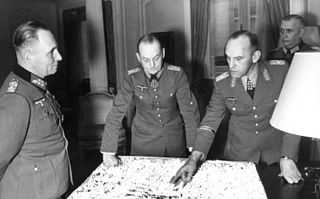Bodo Zimmermann
| Bodo Zimmermann | |
|---|---|
|
Rommel, von Rundstedt, Alfred Gause and Bodo Zimmermann (Hotel George V, Paris on 19th Dec.1943) | |
| Born |
26 November 1886 Metz, Alsace-Lorraine |
| Died |
16 April 1963 (aged 76) Bonn, West Germany |
| Allegiance |
|
| Service/branch | Heer |
| Years of service | 1906–45 |
| Rank | Generalleutnant |
| Commands held | Chef der Führungsabteilung (western sector) |
| Battles/wars | |
| Awards | Deutsches Kreuz in Gold |
Bodo Zimmermann (26 November 1886 – 16 April[1] 1963) was a German general during the Second World War. He also was one of the few recipients of both German crosses (in Gold and in Silver).
Biography
Bodo Zimmermann was born in Metz on November 1886. He began his cadet training in 1906, with the rank of Fähnrich. He immediately joined the Royal Army of Prussia. Zimmermann served in the 145th Infantry Regiment of the King (6. Lothringische) belonging to the 34th Infantrie-Division, stationed in Metz since 1890. In this regiment, he was promoted Leutnant in 1907. From 1907 to 1914 he served in the 145th Infantry Regiment as an officer of the King company with the rank of Oberleutnant (First Lieutenant). In 1915, shortly after the start of the First World War, he was promoted to the rank of Captain. During the war he received the Iron Cross (Kreuz Eisernes) for his exemplary actions. Zimmermann was promoted to Major in 1920 shortly before leaving Army.
After the First World War he ran a publishing house which specialised in military literature. This publisher produced various journals and textbooks for military training of soldiers: "Artilleristen-Fibel", "Gefechts-Fibel", "Uniform-Fibel", "Marinegeschichtsfibel", "Kriegsspiel-Fibel" or "Panzerkampfwagenbuch". Bodo Zimmermann published "Die neue Gruppe" and "Die Soldatenfibel" in 1936, "M. G. 34." in 1937, and "Die Gruppe der Schützenkompanie zu 12 Gruppen" in 1940.
Shortly before the Second World War, Zimmermann was reintegrated in the new armed forces of Germany, the Wehrmacht. As Major, Zimmermann served in the High Command of the 1st Army, on the Western Front. In October 1940, he was appointed "Generalstabsoffizier" at the headquarters of Army Group D, under the command of Erwin von Witzleben. Zimmermann was promoted to the rank of Oberstleutnant (Lieutenant Colonel) on 1 August 1941, under the command of Gerd von Rundstedt. On 1 December 1942, Zimmermann was appointed Oberst (Colonel). On 15 February 1943, he received the German Cross in Silver, for his services. When the Allies landed in Normandy in June 1944, Zimmermann initially believed it was a diversionary tactic. Then, he understood the magnitude of the Operation Overlord and tried to influence the decision of Alfred Jodl. In the Fall of 1944 Zimmermann became Chef der Führungsabteilung on the western sector.
On 25 September 1944 Zimmerman received the German Cross in gold[2] for his actions. He is one of the few recipients to receive the two German crosses. He was promoted to the rank of Generalmajor on 1 December 1944. On 1 May 1945, eight days before the end of the war in Europe, Zimmermann was promoted to the rank of Generalleutnant, just before going into captivity. He remained in captivity until 1947. After 1948, Zimmerman published "Geschichte des Oberbefehlshaber West" and "Ideas on the Defense of the Rhine and Western Germany as an outpost area of Western Europe". Zimmermann died in Bonn in 1963.[3]
Decorations
- Iron Cross of 1914, 1st and 2nd class
- Deutsches Kreuz
- in Gold, on 25 September 1944
- in Silver, on 15 February 1943
- Honour Cross of the World War 1914/1918
References
- ↑ Dermot Bradley: Generaloberst Heinz Guderian und die Entstehungsgeschichte des modernen Blitzkrieges. Biblio Verlag, Osnabrück 1986, ISBN 3-7648-1486-1, p. 374
- ↑ Klaus D. Patzwall, Veit Scherzer: Das Deutsche Kreuz 1941–1945, Geschichte und Inhaber Band II, Verlag Klaus D. Patzwall, Norderstedt, 2001.
- ↑ Dermot Bradley, Kar-Friedrich Hildebrand, Markus Rövekamp, Die Generale des Heeres 1921–1945, Osnabrück 1994
Sources
- Dermot Bradley, Kar-Friedrich Hildebrand, Markus Rövekamp, Die Generale des Heeres 1921–1945, Band 3, Osnabrück 1994
External links
- Bodo Zimmermann on lexikon-der-wehrmacht.de
|
